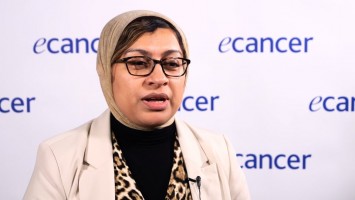The BREAKWATER study is a randomised phase III study looking at the benefit of encorafenib and cetuximab in combination with chemotherapy in patients with metastatic BRAF V600E mutated colorectal cancer.
What was the study design?
The study was evaluating a subset of patients with BRAF V600E mutated tumours. These are tumours that are more aggressive than normal, that have less response to standard of care therapy. We previously knew that encorafenib/cetuximab was approved in most countries internationally in second and third line colorectal cancer and the question was can we combine that with a first-line therapy.
The design was a randomisation, a three arm randomisation to an experimental arm of encorafenib, cetuximab and FOLFOX versus a control arm which was in essence dealer’s choice that included either triplet or doublet cytotoxic therapies with or without bevacizumab. The third arm was encorafenib and cetuximab and this arm for strategic reasons was stopped early in the treatment without looking at the data but we report out the data from those at ASCO as well.
What were the results of this study?
The study enrolled 637 patients. There were two primary endpoints – an overall response rate which had been reported out previously as part of Project Frontrunner from the FDA where accelerated approval could be granted on the basis of response rate, and then progression free survival with the key secondary of overall survival at an interim.
The previous response data had been shared but was confirmed at the higher response rate of 65.7% in the experimental EC plus FOLFOX arm, compared to 45.6% in the control arm. Really strikingly, the progression free survival and overall survival demonstrated benefits of the encorafenib, cetuximab and FOLFOX. The EC-FOLFOX had a median progression free survival of 12.8 months, which was substantially better than the 7.1 months that we see with the standard of care arms.
The overall survival, likewise, a really striking doubling of overall survival. So even though many patients had access to EC in second and third lines and took advantage of that in the control arm, the combination really substantially improved outcomes – a median overall survival of 30.3 months with EC-FOLFOX compared to 15.1 months in the standard of care arm and that was a hazard ratio for survival of 0.49 that was statistically significant.
What is the clinical significance of these results?
These results were very encouraging and especially when paired with the safety data which showed no significant augmentation of adverse events in the EC and FOLFOX arm. It really reiterates the fact that this is a new standard of care for first-line BRAF V600E-mutated metastatic colorectal cancer. What we see is this substantial improvement in overall survival with, of course, improvements in PFS and response rate really are supportive of that.
On the basis of the early response rate readout, an accelerated approval was provided in the US and then with the PFS and OS data we’re anticipating this will turn into a full approval in the US and certainly looking forward to international regulatory agencies reviewing the data as well.
Is there anything else you would like to add?
A really exciting question is this degree of synergy and this recognition that these combinations are providing a substantial benefit. I think a lot of questions that will come out are around the biology of why are we seeing this degree of synergy but really interesting data about how we may be constraining mechanisms of resistance and preventing escape mechanisms that we see with either targeted therapy alone or with chemotherapy alone. So more to learn but I think really sets the stage, not only for BRAF tumours but also other targeted therapies and we look forward to other data with first-line KRAS inhibitors in combination with chemo, data with HER2 agents as well coming. So hopefully a new paradigm on how we think about targeted therapies in first line.








